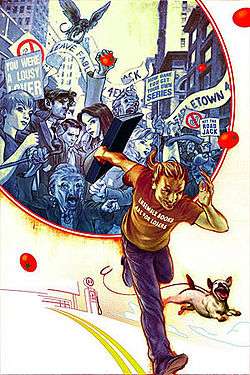Jack Horner (comics)
| Jack Horner | |
|---|---|
|
| |
| Publication information | |
| Publisher | Vertigo Comics |
| First appearance | Fables #1 (July 2002) |
| Created by | Bill Willingham |
| In-story information | |
| Team affiliations | Fabletown |
| Notable aliases | Jack Be Nimble, Jack Frost, Jack the Giant Killer, Jack O'Lantern, Jack of the Tales, John Trick, Jack Candle |
| Abilities | Master con artist. Questionable high strategic skills (brilliantly succeeded in "The (Nearly) Great Escape" and "The Books Of War", but all his other schemes tend to backfire). "Nigh-immortality". High physical endurance. Superhuman strength (especially seen during his fight in "The Great Fables Crossover"). Fourth wall awareness for the major part of his own series. Incredibly successful at cards games (either due to pure talent, luck or cheating). May or may not have inherited Prince Charming's seduction powers to a lesser degree, as well as Literal powers. Ice Queen's powers for a time. Precognition, the ability to become a dragon against his will and reality bending (in the last story arc). |
Jack Horner is a fictional character in the comic book series Fables by Bill Willingham. His first appearance was in issue #1 of Fables and continued as a regular character of the series until leaving the series for his own title, Jack of Fables. The character is based on various nursery rhymes and fables with characters named Jack including Little Jack Horner, Jack and the Beanstalk, Jack and Jill, Jack Be Nimble, Jack Frost, Jack O'Lantern, and Jack the Giant Killer and others.[1]
Characterization
Jack is typically portrayed as a rather being trickster, always looking for quick ways to make a buck. However, Jack also displays a complete disregard for human life or the feelings of those around him, traits most often seen in those with sociopathy. Despite his scheming and reckless personality, he is a devoted foe of the Adversary and a capable combatant in his own right, due to his years of experience fighting giants. He can also have true feelings for others (he asks Beast about Snow White and her cubs, he mourns his wife's death and he considered putting his own safety at risk to protect Gary when the Librarians had captured them and were having a car accident). In the series, Jack creates a film trilogy of his adventures to increase his popularity in the Mundy world making him nigh-immortal (a theory that is still strongly disputed to this day, even by Frau Totenkinder). In his devoted spin-off series "Jack Of Fables", his nigh-immortality seems to be reinforced by other causes as well : he is the son of a literal woman and one of the most popular male Fables and he has made countless deals with many devils during his Jack O' Lantern days. Jack is often presented as believing himself to be far smarter than he truly is and for a man who has lived a long time, has little regard for history (at one point, he compares himself to Sam Bowie and Hector and how "like them, I will be victorious."). The common thread is how Jack honestly believes he is the most important person around and only his needs and desires matter.
The characters of Jack Sprat and Jack Ketch have been established as completely separate entities from the fable Jack, who is in fact a representation of Jack Horner.
In an interesting plot twist, it was recently revealed that Jack was not, in fact, involved in the Beanstalk or Giant-killing incidents, but is actually an unknowing copy of an older fable named Wicked John. Upon Wicked John's death some great power decided to write the trickster back into some later stories, but got his name wrong, thus creating Jack. John was later revived, and now both Fables exist and enjoy a greatly antagonistic relationship.
References
Time top 10 comics in 2007 [2]
- ↑ Irvine, Alex (2008), "Fables", in Dougall, Alastair, The Vertigo Encyclopedia, New York: Dorling Kindersley, pp. 72–81, ISBN 0-7566-4122-5, OCLC 213309015
- ↑ Grossman, Lev (2007-12-09). "Top 10 Graphic Novels - Top 10 Everything of 2007". TIME. Retrieved 2011-04-11.
External links
- The Official Bill Willingham Homepage
- Bill Willingham at Wizard World L.A.: Writer Bill Willingham discusses the legend of Fables and his other current and upcoming projects (video)
- Excerpt of interview with cover artist James Jean from The Comics Interpreter #3 PDF (946 KB)
Vertigo site with comic based on character
- "Vertigo | Graphic Novels". Dccomics.com. 2010-04-21. Retrieved 2011-04-11.
| ||||||||||||||||||||||||||
